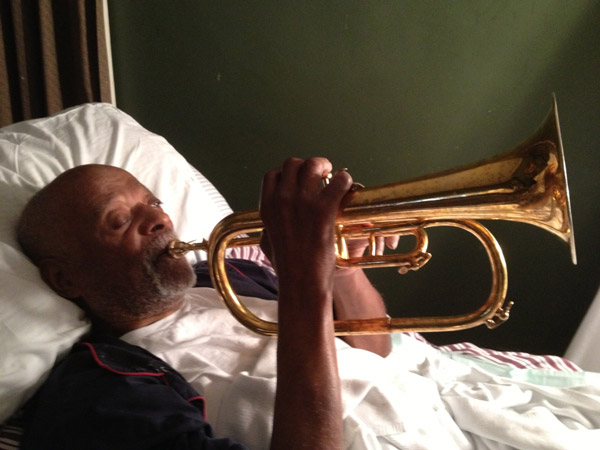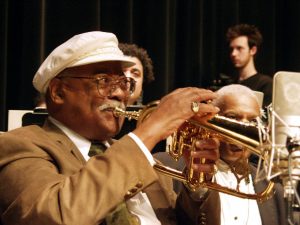14.12. – Happy Birthday !!! He was fortunate enough to have crossed paths with some of the greatest jazz/studio musicians and band leaders of the past 70 years.
Terry is one of the last living links to a rich legacy of African-American culture and jazz dating back to black minstrel shows, the territory bands of the Midwest, the legendary big bands of Count Basie and Duke Ellington, and the studio production orchestras in New York. His new autobiography Clark: the Autobiography of Clark Terry (University of California Press) is a long awaited story of the great joy of playing the trumpet and making music since the early 1930s. Terry’s book is conversational in style but blunt and exacting in detail about people and dates; he holds nothing back.
Born in December of 1920 and the seventh of eleven children, Terry’s upbringing was in a poor section of St. Louis MO. The inspiration and drive he had to learn music and play the trumpet is always front and center in his narrative. The story he tells is compelling starting with a first ‘makeshift’ musical instrument produced from junkyard parts. Terry is probably the most direct and honest when speaking about the racism he faced while traveling with musical acts across the southern United States and later dealing with the management at NBC television in the early 1960s in New York.
Terry dispels many myths about people such as Count Basie and Miles Davis and relationships with other musicians and musical groups. Terry had grown up with Miles in St. Louis and was just a few years older than Davis. The most inspiring and provoking prose from Terry is on his time spent with Duke Ellington during the 1950s. Terry specifically documenting his close musical association with Ellington is a delightful read; his commentary on Billy Strayhorn is equally insightful. A grateful attitude seeps into the writing. He is immensely thankful for the opportunities he was given to play with the greatest of the greats in jazz and pop music.
He devotes a great deal of time and importance talking about teaching music. Terry makes an important point about passing on the gift of jazz to a long list of students over the years starting with Quincy Jones as his first trumpet pupil in the late 1940’s.
There are very few criticisms one could give the book. Terry attributes Charlie Shavers and Roy Eldridge as particular trumpet influences. I would have expected Terry to credit more players and recordings as influences in his own sound and approach, but he mentions only those two trumpeters and then only in passing. Terry also talks about playing through the Arbans method book and a clarinet method book. Like a baseball hitter is the only one who can truly say if he was hit by a pitch, Terry is the only one who can truly say who influenced him, so we have to take him at his written word.
Included is a detailed discography compiled by Tom Lord, Terry’s list of compositions, and his list of awards and honors. Introductions, forwards and prefaces are written by Bill Cosby, Quincy Jones and David Demsey. It is well worth your time to read.







More Stories
CD review: George Benson – Dreams Do Come True: When George Benson Meets Robert Farnon – 2024: Video, CD cover
The band was tight as ever. The Warren Haynes Band cuts loose: Video, Photos
Interview with Alvin Queen: Feeling Good – I heard these tunes played by … Video, new CD cover, Photos